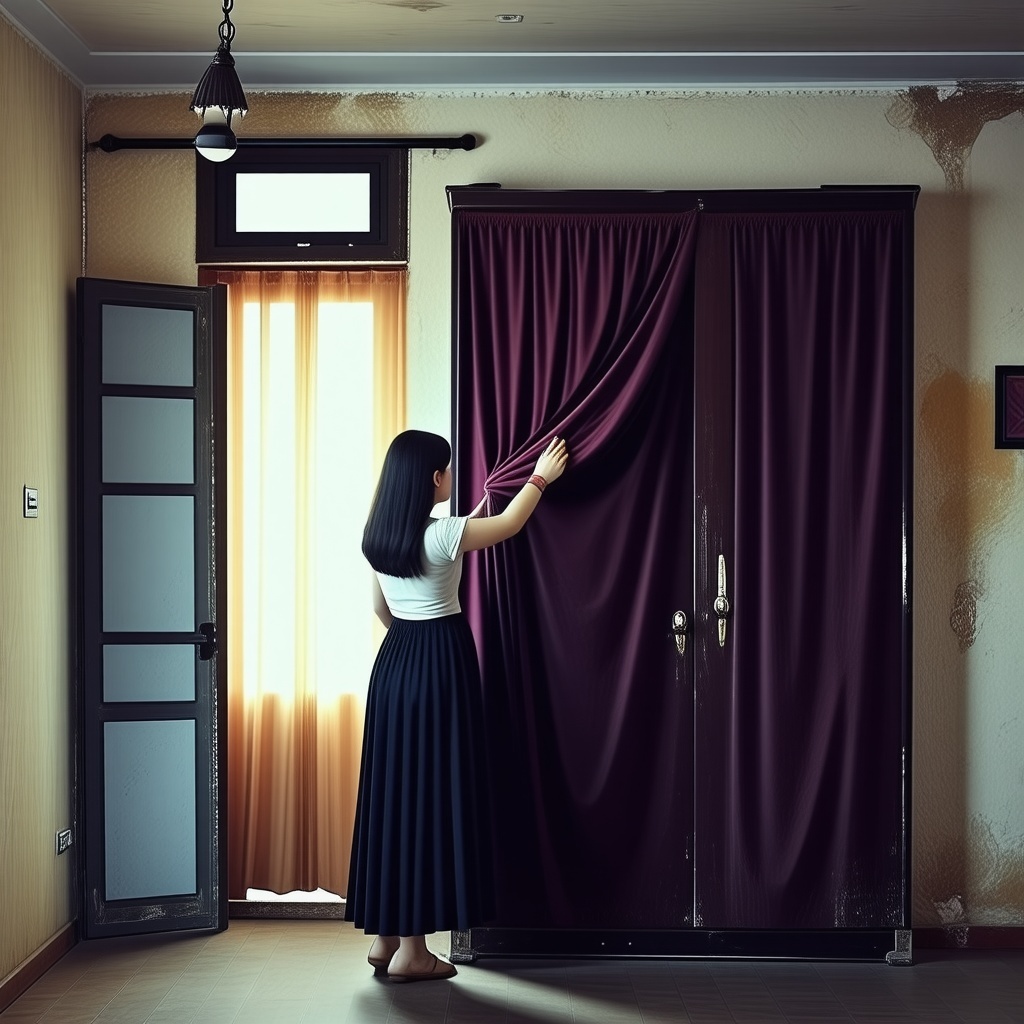I was never one to snoop. Not out of virtue—just habit. But that evening, curiosity had its own plans.
It was the last day of summer break, and I was staying at my aunt Meena’s house in Dehradun. My cousin Nikhil had left for a friend’s party, and the house was strangely quiet. As dusk settled, I wandered through the old bungalow, letting my fingers trail the dusty walls and half-read novels stacked like miniature towers.
That’s when I heard it—voices. Muffled, urgent, and close.
I paused near the drawing room, where a heavy velvet curtain hid the old storage cupboard. Aunt Meena often joked it was her “second kitchen,” but we were never allowed to open it. It wasn’t until that day I realized there was a narrow gap between the curtain and the wall.
I ducked behind it, more out of instinct than intent. A small slit in the cupboard’s wooden panel let me peek into the kitchen.
Two men stood near the back door. One of them was my uncle Ramesh. The other—a stranger in a dark green coat—carried a leather duffel.
“You didn’t say it was this much,” the stranger said, voice sharp.
Uncle Ramesh didn’t flinch. “Keep your voice down. The girl’s still in the house.”
They both glanced around. My heart stuttered. I leaned back quietly, careful not to knock anything.
“How do you expect me to carry this across without raising suspicion?” the man said. “Even airport dogs can smell this stuff.”
“Keep it in your car for now,” Uncle Ramesh replied. “Drive through the hills tomorrow at dawn. The checkpoints will be unmanned.”
The man opened the bag slightly. I saw plastic packets—carefully sealed. I didn’t need to see the labels. I knew. It was **drugs**. A lot of them.
“Meena knows?” the man asked.
Uncle Ramesh shook his head. “She thinks I sell antique coins online.”
They both laughed—a low, disgusting sound.
“Don’t worry about the girl either,” Uncle Ramesh added. “She leaves tomorrow. I’ll clean everything after.”
My blood ran cold. I pressed back against the cupboard, barely breathing.
They moved toward the back door and left.
I waited a full minute, then stepped out slowly, heart hammering in my throat.
I didn’t sleep that night. I lay in bed staring at the ceiling fan, wondering if I had misunderstood. But the image of those plastic packets haunted me.
Next morning, at breakfast, Aunt Meena hummed as she flipped dosas. Uncle Ramesh smiled too easily.
“You packed?” he asked.
“Almost,” I said, voice stiff.
“I’ll drive you to the station around 4,” he offered.
I nodded, barely able to meet his eyes.
On the Way to the Station
I had a plan by then. I’d written a note—short and precise—and slipped it into Aunt Meena’s purse before we left. I couldn’t be sure if she’d believe it, but she deserved the truth.
More importantly, I had taken pictures of the bag and the conversation—there was an old CCTV camera above the back door that no one remembered. Nikhil had shown me the feed on his tablet once. I accessed it that morning and took screenshots of the men with the duffel.
As we drove toward the station, I kept glancing at my watch.
4:20 p.m. The train wasn’t due until 4:45.
“Need snacks for the ride?” Uncle Ramesh asked.
“No, I’m okay.”
He parked and reached for my bag to help. I grabbed it myself.
“You sure you’re alright?” he asked.
I smiled tightly. “I’m fine.”
He waited until I stepped onto the platform, then turned and walked back toward his car.
I waited until his car was out of sight, then walked straight out the other side of the station.
I had no intention of boarding that train.
One Week Later
Uncle Ramesh was arrested on the outskirts of Rishikesh. The police caught him with two duffel bags packed with MDMA and ketamine. The man in the green coat was caught near the UP border.
It turned out they were part of a small but growing ring smuggling designer drugs through the Himalayan towns, using guest houses and unassuming homes as transport hubs.
The evidence I had submitted—photos, CCTV stills, the license plate of the car—had been more than enough for the Narcotics Bureau to act swiftly.
Aunt Meena called me crying. She had found my note. It said simply:
“I’m sorry to tell you like this, but your husband is not who you think he is. Please check the drawer behind the spice rack.”
She did. She found more bags. More lies.
Now
It’s been three months. I’m back in college, trying to focus on books and normalcy.
But every time I walk past a cupboard or hear muffled voices behind a door, I remember that night. The voices I wasn’t supposed to hear. The truth I was never meant to know.
Some secrets whisper. Some shout.
And some find you, even when you weren’t listening.
But every time I walk past a cupboard or hear muffled voices behind a door, I remember that night. The voices I wasn’t supposed to hear. The truth I was never meant to know.
Some secrets whisper. Some shout.
And some find you, even when you weren’t listening.
They leave a mark — not on your skin, but in your trust, in how carefully you now listen, even when you pretend not to. Silence isn’t always empty.



 React
React
 React
React
 React
React
 React
React
 React
React